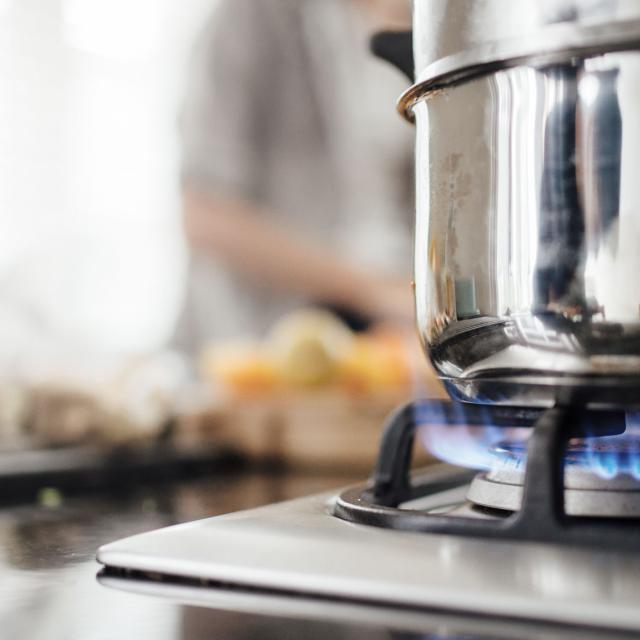Watch out for kitchen fires!

Did you know that nearly one-third of the 22,000 house fires that have occurred in Québec since 2013 started in the kitchen? For nearly half of those, the main culprit was: distraction! The bright side of these statistics is that human causes can be tackled by changing habits and behaviours. So what are the things you can do—and the errors you can you avoid—to minimize the risk of kitchen fires? Read on to find out how to prevent a serious kitchen disaster.
Avoidable human errors
When we think of a kitchen, we often think of an inspiring space filled with laughter, good food, and warm memories. But kitchens can also be full of dangers, some of them hiding in plain sight. And with our busy lives, we’re even more likely to be distracted, tired, rushed, or even negligent. That’s why you need to stay sharp and be careful! Here are some of the most common errors to avoid:
- Although it can be tempting, doing several things at once (e.g., cooking while using your phone or watching TV) is a bad idea.
- Don’t heat your burners until you have something to put on them and remember to turn them off as soon as you’re done.
- Don’t leave flammable objects near cooking surfaces (much less on them!).
- Some foods cook a lot faster than you’d think. Whatever you put on the stove or in the oven, check it often.
- Don’t underestimate oil. It’s dangerous. The hotter it is and the more you use, the greater the caution you need to exercise. Many kitchen fires are caused by improper use of cooking oil.
Remember: Water and oil don’t mix! Water feeds and spread oil fires. Never attempt to extinguish an oil fire with water. Protect yourself with oven mitts and use a cover to smother the fire.
Good habits go a long way
Prevention is also a matter of getting into good habits that, over time, become reflexes. The more you have, the safer you’ll be! Our prevention experts have drawn up a list of them for you:
- Use a timer.
- Keep a close eye on food as it cooks.
- Be sure to keep your cooking surface clear of any clutter.
- Be careful with pot and pan handles: put them at an angle that keeps them out of the way as you cook.
- If you want to deep fry something, use a fryer! An approved fryer with a built-in thermostat makes a wise investment. A pot filled with oil is much more dangerous and much more likely to cause serious injury.
- Always keep a cover and oven mitts within arm’s reach.
- Get into the habit of cleaning your cooking surfaces and range filter regularly to keep grease from building up and potentially catching on fire
- Choose the right pot or pan for the job. If the contents boil over, they could catch fire.
- Wear safe clothing (ideally, no long sleeves and no flammable materials when using the stove).
Remember: As a general rule, cooking with caution is the best way to prevent kitchen fires, as well as burns and other accidents that can quickly take all the fun out of preparing a nice meal.
Kitchen tools to use carefully
Some kitchen tools require a little extra vigilance. Be especially careful when using:
- Fondue pots and burners
- Fryers
- Avoid using a saucepan for deep frying food. Instead, use a high quality deep fryer equipped with a thermostat. Follow the instructions on how to use it properly. Heat the oil slowly. Once you are finished frying, immediately turn off the fryer as recommended by Sécurité publique du Québec.
- Microwave ovens
- Raclette grills
- Waffle makers
- Hot plates
- Toaster ovens
- Indoor barbecues
For all of these tools, read the instruction manual to make sure you’re familiar with the do’s and don’ts of using them properly.
What to do in the event of a cooking fire
In the event of an accident, don’t panic. Here are a few tips:
- Do not try to move a burning pot or fryer.
- Try to extinguish the fire by placing a lid on it, using an oven mitt to avoid burning yourself.
- Unplug the unit if the power cord is accessible; in the event of stovetop fire, turn off all heating elements.
- Turn off the kitchen hood fan.
If the fire goes out:
- Call the fire department: it is possible the fire may have spread into the hood duct.
- If there’s smoke, open windows and doors to air things out.
If the fire spreads:
- If possible, close your windows and doors, quickly evacuate your home, and call the fire department.
These tips should help you know what to do in the event of a fire. We also recommend having your range and the cooking appliance that caused the fire inspected to make sure they are still safe to use.
As you can see, there are lots of easy ways to avoid accidents in the kitchen! Of course, when it comes to house fires, having smoke detectors, portable extinguishers, and a good evacuation plan is a must, no matter where the fire starts!



